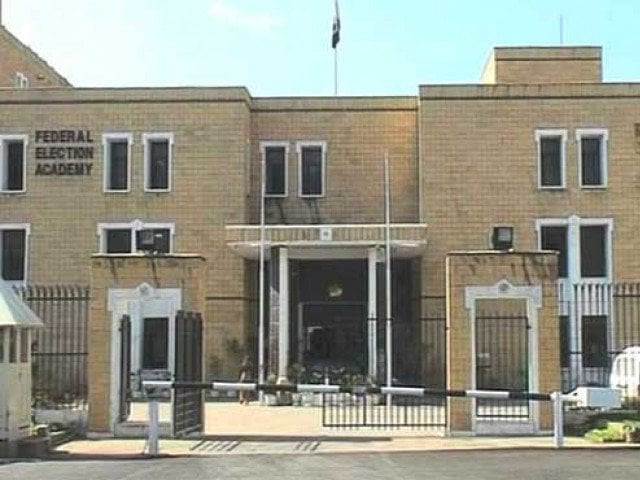HEC chief's tenure comes to an end
Provincial commissions in Punjab, Sindh posed a challenge to Mukhtar Ahmed

Provincial commissions in Punjab, Sindh posed a challenge to Mukhtar Ahmed. PHOTO: FILE
He is leaving behind a mixed legacy of achievements, red-tapism and failures on certain fronts.
Nevertheless, the next chairperson will have to face several key challenges at home and while collaborating with universities in provinces in the backdrop of devolution.
Ahmed was appointed in April 2014 by former prime minister Nawaz Sharif.
Previously he served as HEC's executive director. His appointment was also supported by Interior Minister Ahsan Iqbal, who headed the committee for the selection.
Ahmed's ascendancy at the HEC was marked by tensions created by former HEC chief Javed Laghari and the unceremonious departure of ED over rights of seniority and regularisation of a few dozen internal employees.
Known for his composure, he pledged to change HEC's internal and external outlook.
International partnerships: HEC, Thai Institute plan joint research
He brought with him the experience of working as the deputy director-general of the Islamic Educational, Scientific and Cultural Organisation (Isesco) in Rabat, Morocco.
Internally, those up in arms stepped aside with baited breath awaiting some change, while externally universities needed rigorous check on quality, governance and transparency.
External front
His troubles intensified after the formation of provincial higher education departments in Punjab and Sindh.
The tussle with both provinces continued on this issue and only the universities suffered. The clash lately reached a point where heads of universities from these provinces were barred from attending a vice-chancellors' committee meetings arranged by the federal HEC.
Meanwhile, the prime minister announced a laptop scheme for university graduates. So far. about 300,000 students have benefited from this programme. Other incentives offered by the government included a fee waiver scheme for students of less developed areas in the country. Since both the projects were flagship programmes of the ruling party so the chairperson took personal interest in the matter despite doubts cast on laptops' quality.
The HEC tried to tighten the noose around the universities running faulty graduate programmes.
According to HEC data, as many as 300 PhD programmes were either shut down or warned for poor quality. But several academics criticised the inverse mechanism: they contended that it should have been started with undergraduate programmes.
The HEC was also blamed for targeting selected universities and sparing private sector institutions with clout.
Faculty development : Education termed key to national uplift
Similarly, at least 20 new sub-campuses were set up during his term in different parts of the country, including over 10,000 domestic and about 8,000 foreign scholarships.
The HEC also established a Rs2 billion technology development fund for technologist encouraging prototypes for problem-based solutions.
HEC's development budget jumped from Rs15 billion to Rs22 billion, but fund utilisation remained a major problem.
It (the HEC) undertook three rankings but all of them proved to be controversial. Most educators termed them biased, based on poor indicators and against international standards, forcing the HEC to abandon these rankings altogether.
International rankings of Pakistani universities also suffered: Now only three are ranked internationally against the previous number of six.
The HEC also established its own Education Testing Council (ETC) last year after the LHC found national testing service conducting tests illegally. The ETC is still poorly managed and and has the potential of becoming a serious problem for HEC.
Internal Front
Internally, the chairperson also struggled on several fronts. Some of these issues could even haunt him even after he left the post.
Ahmed mostly preferred to keep things under close scrutiny and that led to clash with senior officers within the commission. Over the past four years, HEC's governing body met only four times and the last meeting was held in February 2016. Two years have passed without a single meeting.
This also led to appointments of senior advisors and consultants on ad-hoc basis and without approval of the commission.
HEC's degree verification process is still outdated and does not utilise state-of-the-art procedure. The only innovation brought to this process was making it available online.
HEC has no mechanism to check fake degrees issued in connivance with officials of various universities.
Similarly, the HEC also lacks ways and means to check thousands of scholars who return from foreign countries but submit fake affidavits of engagements with Pakistani universities, allowing them to return to lucrative jobs without completing the five-year mandatory tenure.
Nothing has been done to fix the issue o over 1,500 scholars who completed their PhDs but could not get registered with the HEC directory for some reason or other.
The chairperson was helpless to take action against HEC functionaries accused of resorting to plagiarism.
The chairperson used to keep his friends close and his "enemies" closer still.
In his last speech on Friday he told HEC's top management that he would be back in the next 15 days.
Interviews for the new chairperson would be held between April 19 and April 21. As many as 116 candidates are learnt to have applied.



















COMMENTS
Comments are moderated and generally will be posted if they are on-topic and not abusive.
For more information, please see our Comments FAQ